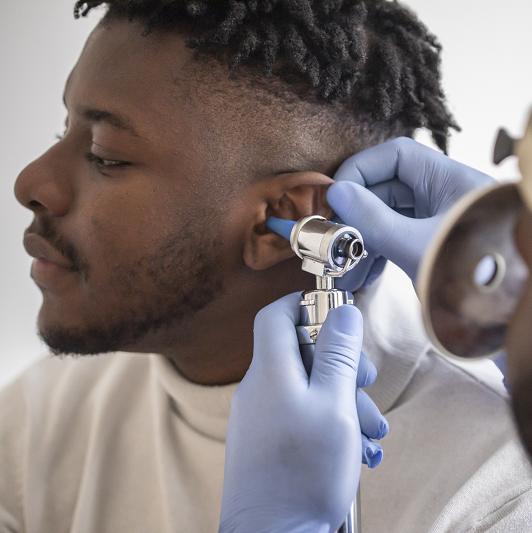Can Hearing Aids Make Hearing Worse?

August 22, 2022
“Hearing aids are designed to help improve the quality of what you hear,” says Virginia Gural-Toth, Au.D., CCC/A, manager of audiology services at the Center for Audiology at JFK Johnson Rehabilitation Institute. “However, someone who is not fit with the correct hearing aid for their hearing loss may damage their hearing.”
Why People Think Hearing Aids Cause Hearing Loss
Those who grow accustomed to hearing aids may believe that their hearing has deteriorated. But they’ve simply gotten used to hearing better with their assistive devices.“Before their hearing aids, they may not have realized how poor their hearing was,” says Gural-Toth.
Some people choose over-the-counter amplifiers or hearing aids to cope with hearing loss. However, some of these devices may actually be harmful to hearing.
“Some devices amplify all sound, which may make it harder to hear,” says Gural-Toth. “Amplified sounds that are too loud may cause further hearing loss.”
What Hearing Aids Can and Can’t Do
If you have hearing loss, hearing aids may improve your sense of hearing. But they won’t restore your hearing to what it was before your hearing loss.“Hearing aids amplify sounds so you are more aware of what is going on around you, like hearing friends and families’ voices while in a crowded restaurant. They can also help reduce unwanted background noise which makes listening easier,” says Gural-Toth.
Some hearing aids allow you to connect wirelessly to Bluetooth devices. This may help you hear your TV or cell phone better… even live theater performances.
Where to Go to Get Hearing Aids
Your primary care physician or ear-nose-and throat specialist (otolaryngologist) can refer you to a licensed audiologist who will test your hearing. Licensed audiologists fit people with hearing aids, then personalize them for your needs.Audiologists may suggest different styles of hearing aids, such as:
- In-the-canal styles, which fit into the ear canal (opening)
- Completely-in-the-canal styles, which are tinier than in-the-canal styles
- In-the-ear styles, which take up more space within the ear than just the canal
- Behind-the-ear styles, which hook behind the ear and have tubing that goes in the canal
- Receiver-in-the-ear styles, which hook behind the ear and have a wire going into the canal
- Open-fit styles, similar to receiver-in-the-ear styles, have openings, allowing sounds to reach the ear
An audiologist can help you decide which hearing aid is right for you. They choose technology to make it easier for you to hear, based on your lifestyle.
Your audiologist will also help fit you with your hearing aids. People who aren’t fitted properly may not wear their hearing aids, because they hurt.
Benefits of Hearing Aids
Beyond improving your hearing, properly fitting hearing aids have other benefits including:
- They allow you to maintain your social life, because you can hear your friends
- They may lower your risk of depression and anxiety, which rises with hearing loss
- They may lower the risk of dementia in older adults with hearing loss
- They help to improve life satisfaction among people with hearing loss
“If you’re concerned about hearing loss, don’t ignore it – seek help,” says Gural-Toth. “Most hearing loss may be improved with assistive devices like hearing aids.”
Next Steps & Resources:
- To find an audiology center near you, please visit our website.

Why Do My Ears Feel Clogged? 4 Common Causes & Treatments
Experts share the most common causes of clogged ears, and what to do if you experience this sensation.

Hearing Impairment and Masks: 8 Tips
Masking and social distancing during the COVID-19 pandemic has created significant communication challenges for people with hearing impairment.

What Are the 3 Types of Hearing Loss?
Hearing loss can be broken down into three main types, depending on what part of your hearing is damaged. Here's what you should know and how hearing loss is diagnosed.

5 Ways to Prevent Hearing Loss Caused by Headphones
While headphones can be incredibly convenient, they can also cause noise-induced hearing loss.

8 Reasons to See an ENT
If you find yourself dealing with frequent nosebleeds, vertigo or ringing in the ears, you may need to see an ear, nose and throat (ENT) specialist.

4 Steps for Diagnosing Dementia
Manisha Parulekar, M.D., division chief of geriatrics, explains the steps in diagnosing dementia or cognitive decline.
